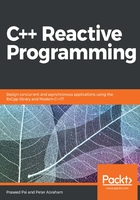
Functional reactive programming
Almost all modern programming languages support functional programming constructs. Functional programming constructs such as Transform, Apply, Filter, Fold, and so on are good for processing streams. Programming asynchronous data streams using functional programming constructs are generally called functional reactive programming (for all practical purposes). The definition given here is an operational one. Consult the work done by Conal Elliott and Paul Hudak as part of the Haskell community to understand the strict definition. Mixing Reactive Programming with FP is gaining traction among developers these days. The Emergence of libraries such as Rx.Net, RxJava, RxJs, and RxCpp and so on is a testimony to this.
Even though reactive programming is the core subject of this book, in this chapter we will be sticking to an OOP approach. This is necessitated because of the fact that we need to introduce some standard interfaces (emulated in C++ using virtual functions) necessary for doing Reactive programming. Later on, after learning about FP constructs supported by C++ , readers can do some mental model mapping from OOP to FP constructs. We will also keep away from concurrency stuff to focus on software interfaces in this chapter. Chapters 2, A Tour of the Modern C++ and Its Key Idioms, Chapter 3, Language-Level Concurrency and Parallelism in C++, and Chapter 4, Asynchronous and Lock-Free Programming in C++, will give the necessary background to understand reactive programming using FP constructs.